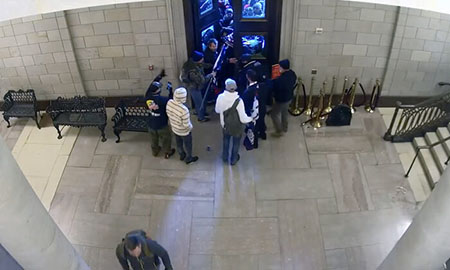by WorldTribune Staff, April 9, 2024
A three-judge panel of the D.C. Circuit Court of Appeals on Tuesday upheld a statute that criminalizes “parading, picketing or demonstrating in a Capitol building,” a law that has been used against hundreds of Jan. 6 protesters.
 Protesters inside the Capitol on Jan. 6, 2021. / Video Image
Protesters inside the Capitol on Jan. 6, 2021. / Video ImageThe court rejected the challenge of John Nassif, who entered the Capitol on Jan. 6, 2021 and was among those chanting “Whose house? Our house!”
Nassif, of Winter Springs, Florida, was convicted in 2022 of the charge of entering or remaining on the restricted grounds of the Capitol — as well as three other misdemeanors. He completed his seven-month sentence in January.
Nassif argued that the law prohibiting parading and picketing was unconstitutional because the Capitol building, including its historic rotunda, is traditionally open to the public and therefore cannot significantly restrict demonstration activity. The court rejected that contention, concluding that because the building is actually Congress’s workplace — and was designed primarily for legislating — Congress is well within its power to prohibit activity that might disrupt its job.
“Inviting myriad parades, demonstrations, and pickets inside the Capitol buildings would disrupt the very legislative process that the buildings are designed to accommodate,” Judge Cornelia Pillard wrote for the three-judge panel.
Pillard was appointed by President Barack Obama. The other two judges on the panel, Bradley Garcia and Michelle Childs, were appointed by Joe Biden.
Pillard noted that entry to the Capitol is “strictly regulated” and that members of the public typically must reserve a tour and face security screening before entering. Those restrictions, the court said, underscore that the Capitol is not “generally open for use by members of the public to voice whatever concerns they may have — much less to use for protests, pickets, or demonstrations.”
The Supreme Court is set to hear arguments next week in a case that could upend hundreds of J6 felony prosecutions for obstructing Congress.
Source link

